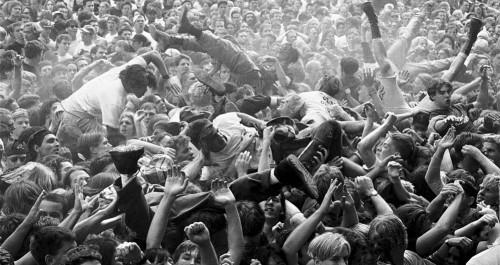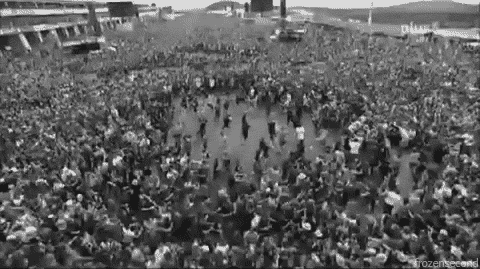Day one, first semester and last year of my education at RMIT. I’m pretty excited and also scared to see how shit plays out. In my time here I’ve got to say I’ve loved every moment of it, but I’ve struggled badly with doing and retaining the readings, and also making any real connections with people. Already in our first classes we have to forge our own groups and I’m dreading this process and I have a feeling I’m going to be just chucked into whatever raggidy bunch is left at the end. I’m back in the class with activist Liam Ward leading the way, kinda exciting as the subject is trying to turn political documentaries into an art form but staying true to being a documentary. Whatever that means? I mean I only took up one semester of film study so I can’t really pull quotes or examples out of my ass, but the problem with documentaries, at least from what I picked up in the first class, seems to mainly be about definition. You have your purists who say things need to be only a certain kind of way and then you kinda have a mixture of everyone else who treat it more as.. (for lack of a better phrase I’ll quote a quote I heard Liam use by John Grierson)”the creative treatment of actuality”. I don’t know if this approach to something is really the best way to do things, where you pick a set definition for what you’re setting out to do and try to make sure it fits in your little box of definitions. Particularly with a political documentary, I believe what you’re trying to posit is a rhetorical argument of sorts, so it’s not so much like a wildlife documentary where your focus really is on the images and videos you see on the screen “oooh look at the pretty zebra getting mauled by that cheetah, nature such beauty, much love, so bloods”. It’s the visual aid that really pulls you in, but with a political documentary, you’re not showing people things they can’t catch a glimpse of, you’re trying to incept an idea into their minds. It’s not about the visuals, it’s about the message they carry. Thats not saying the visuals aren’t important, but they are a means to an end.
From watching the Adam Curtis documentary “Century of the self”, I found some clarity in how I would ideally tackle the task. He points out how giving people factual information and telling them what something does as well as how and why it will benefit them, simply isn’t effective. The way to sell an idea, I feel, is like selling a product; it’s not about trying to appeal to peoples intellect, but to their selfish inner desires, that they will feel better knowing they’ve experienced it. It’s not that you think you need this knowledge, but you’ll feel better knowing you have it. How that will help me at the moment? I really have no fucking idea, but it’s the groundwork I hope to use to realise any work I do.
And then on the way out of uni I stopped by the Socialists little hut outside building 8 to sign a petition and ended up arguing with the lady about the role of capitalism. I argued that for it to be the dominant form of social structure today, there had to be some valid points in it’s prevalence. She simply refused to see what I was trying to ask and told me to go and figure it out on my own.. well the thing is I already know the plus points of capitalism (it’s just a shoddy list but the basic ideas are there) but noting how she had that biased opinion and disregarded the benefits whatsoever kinda helped me understand a little more why socialists are hard pressed to really get their message spread. They’re almost like the religious extremists of the political world, and they shun the thought of any system outside of their own. Much like making a documentary by defining what it is first and then trying to squeeze the real world into that criteria, isn’t really a conducive way to disseminate your message. The socialists today remind me of the capitalists against the monarchs. They faced similar issues, except perhaps this time on a global scale; a rich ruling class that basically owns most of wealth and run how the world works, a class that you mostly had to be born or married into – then you have the people who feel like they’re being unfairly treated and are demanding change. If anything the actual history of socialism is evidence enough to show that it’s a terrible idea because it eventually just turning back into that “monarchy” type situation where the country is run by a ruling class or family that can never be voted or kicked out, one that abuses it’s people just the same, if not worse than any capitalistic democracy. Just like the barons who fought the monarchs for the magna carta, the rich and powerful eventually formed a new kind of kingdom, this time, it’s just a little more invisible, and now history looks like it’s attempting to repeat itself.
I know this is sensitive stuff, and I’m not exactly the best versed in any of these areas or topics, but this is just my opinion from what I’ve managed to see thus far. The consensus..
Everyone is nuts.
Maybe Freud was right, we’re all just a bunch of crazy mafakkas and we’re just going to kill each other dead. Argue with me if you want, but don’t be dumbass and don’t waste my time with definitions or be all like capitalism is evil because it’s ‘exploits the people man!!’. People are evil, and they do bad things. It doesn’t matter what political affiliation or style of life they choose to lead, if a rich dick wants to be a dick, he’s going to be a dick. And not all rich people are dicks.
Peace. Seriously.





